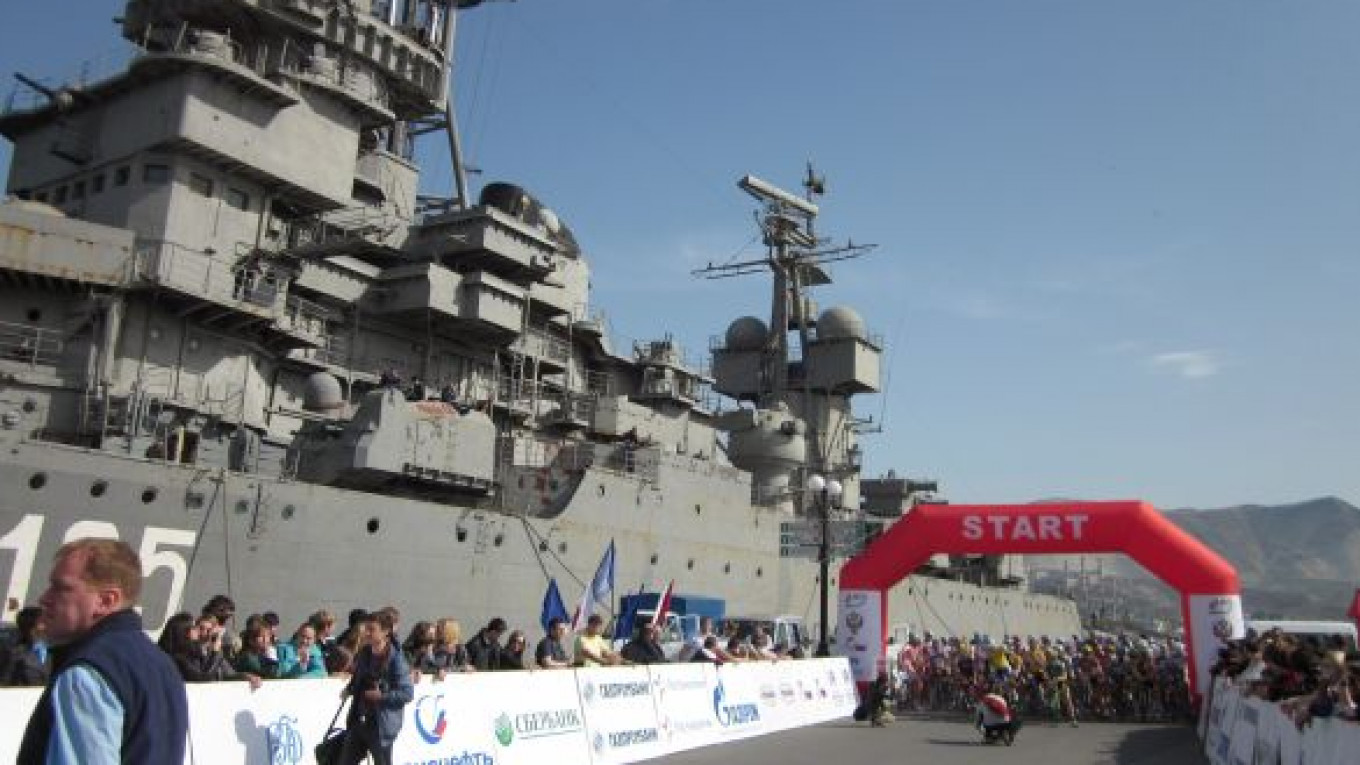SOCHI, Krasnodar Region — Sochi, home to the 2014 Winter Olympics, hopes to add a top cycling race to its growing list of major international sporting events.
Alexander Gusyatnikov, a senior official with the Russian Cycling Federation, said his country wants to organize a weeklong Pro-Tour race as early as next year.
"It's an ambitious project, but we think we can do it," Gusyatnikov said following this month's Tour of Sochi — an annual international stage race along the Black Sea coast.
"We plan to call it the Tour of Russia — a smaller version of the famous Tour de France race," he said. "It would start in St. Petersburg, continue to Moscow, then riders would fly to Sochi for another three or four days through the Caucasus Mountains."
He said the Russians would submit a proposal to the sport's world governing body, UCI, by June to have the race on the international calendar for next year. "But if we're not ready next year, we'll definitely stage it in 2014," he said.
In addition to the Winter Games and the 2018 football World Cup, Sochi will also host the country's first Formula One grand prix from 2014 after signing a seven-year deal with motor-racing boss Bernie Ecclestone in 2010.
A major cycling race would fit nicely into the global cycling project, created by wealthy businessman and Russian Cycling Federation chief Igor Makarov, who also founded Pro-Tour team Katusha. Makarov, a former professional rider who made his fortune in the gas industry, sees the Sochi race, held this year for the 58th time, as a stepping-stone for a future Pro-Tour event.
But for that to happen, Russia must first build good roads.
Asked what has to be done for Russia to stage a Pro-Tour race, Gusyatnikov was blunt: "two things: money and roads."
The Russian government has allocated nearly $200 million to build a motor-racing circuit in Sochi and to improve streets around the city. Gusyatnikov said the plan calls for the rebuilt streets to be used for the cycling race as well.
Ironically for a second year in a row, the Sochi race started and finished in Krasnodar, the region's capital, while the Black Sea resort and most of the surrounding area still resemble a huge construction site ahead of the 2014 Games.
UCI commissar Mladen Durlen of Croatia said the race has found its niche on the international calendar, attracting up-and-coming riders from many European countries.
"I see it becoming bigger and better, so you get stronger riders as several continental teams were taking part this year," said Durlen, who also was the race chief in 2005.
Asked why there was no team from Croatia, Durlen said: "It's quite expensive for them to come here, paying the airfare and so on. Besides, there are so many races in central Europe they can get to by bus or by car. It's much cheaper."
German coach Viktor Hamann, whose team Nutrixxion has won the two previous races here, had a different view. "I don't think coming here is all that expensive. You just have to book your flights well in advance," he said.
"Our guys love coming here, they enjoy the hospitality, local cuisine, just about everything. I speak fluent Russian, so my boys never have a problem," added Hamann, an ethnic German who was born in Omsk before emigrating to Germany in 1990.
Serbian Ivan Stevic won this year's April 4-8 race to boost his chances of making his country's Olympic team in London. "I think it was a great race — the organization, the hospitality, everything was first class," said Stevic, who beat some 150 competitors from 10 European nations after battling the elements, the mountains and treacherous roads for five days and nearly 900 kilometers.
"Of course the roads could be much better, but I think the Russians could easily solve this problem with all the money they have. Still, I'm happy that I came here. Russia has been very good to me lately, as I also won a race in Moscow last year."
Not everyone was as enthusiastic as Stevic.
"Roads are quite bad," said fellow Serb Zolt Der, who had lost any chance for the overall victory after finishing more than 12 minutes behind the leaders on the first stage. "There were so many potholes and debris that punctures have become common. I had two on day one but somehow managed to finish."
Austrian Michael Gogl was more forgiving. "We really enjoyed being here," he said. "As for the roads, we've seen much worse roads, in Central America for example, than here."
A Message from The Moscow Times:
Dear readers,
We are facing unprecedented challenges. Russia's Prosecutor General's Office has designated The Moscow Times as an "undesirable" organization, criminalizing our work and putting our staff at risk of prosecution. This follows our earlier unjust labeling as a "foreign agent."
These actions are direct attempts to silence independent journalism in Russia. The authorities claim our work "discredits the decisions of the Russian leadership." We see things differently: we strive to provide accurate, unbiased reporting on Russia.
We, the journalists of The Moscow Times, refuse to be silenced. But to continue our work, we need your help.
Your support, no matter how small, makes a world of difference. If you can, please support us monthly starting from just $2. It's quick to set up, and every contribution makes a significant impact.
By supporting The Moscow Times, you're defending open, independent journalism in the face of repression. Thank you for standing with us.
Remind me later.






